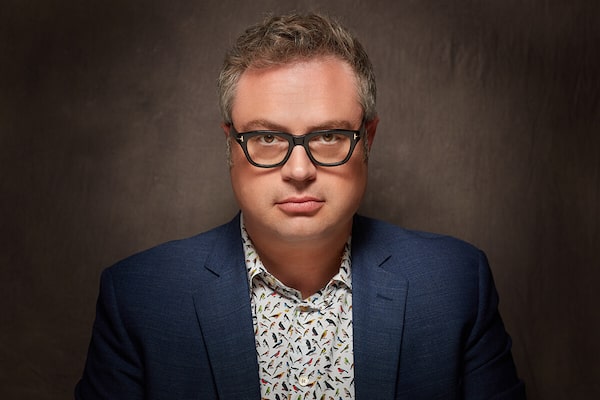
Steven Page self-produced his latest release, Excelsior.DAVID BERGMAN
Since leaving Barenaked Ladies in 2009, Steven Page has been nothing if not industrious. He’s recorded four solo albums, composed the music for Bartholomew Fair: A Comedy at the Stratford Festival, competed on the game show Bumper Stumpers, frequently collaborated with the Art of Time of Ensemble, and co-founded the Trans-Canada Highwaymen with Moe Berg of the Pursuit of Happiness, Chris Murphy of Sloan and Craig Northey of the Odds.
On Sept. 8 of this year, however, Page had an unlikely task: Performing at the Bear Club in Luton, England, he was a Commonwealth citizen called upon to announce the news of the death of Queen Elizabeth to his audience. The 52-year-old singer-songwriter flew back to North America on the day of the funeral but his flight was grounded for hours because air traffic was forbidden while the service was under way.
By coincidence, Page’s latest album, the self-produced Excelsior, deals with grief and loss. While the record’s first seven songs form a heavy, conceptual suite, the record ends on an upbeat note, with spryer pop songs that include Xylorimba and the album’s first single, Zoom.
The title of Zoom is a reference to Page’s virtual concert series Live From Home that he has been conducting via Zoom since April, 2020, from his home near Syracuse, N.Y. The shows, limited to 1,000 ticketed audience members, vary in content that is often themed. For his alphabetical episodes, Page needed songs for ‘X’ (hence Xylorimba) and ‘Z’ (hello Zoom).
“The last four songs are lighter and brighter, which is kind of the opposite of how you’re supposed to structure an album,” Page said. “But when I recorded them, I thought ‘I guess that’s the end of the record.’ ”
Page spoke to The Globe and Mail about life’s existential questions, the concessions of midlife artists and the meaning of making albums in the 21st century.
Your new album begins with church bells, an organ and a choir. Has Steven Page found religion, or is this satirical?
It’s more ironic than satirical. The first song, Feel, is a kind of journey by somebody who is in mourning. It’s about the symbols of grief and the things we say that end up sounding hollow and meaningless.
The record’s second song, What’ll I Do Now, is also about loss. Is the material autobiographical?
Not specifically. A lot of us have been grieving over multiple things the last few years. The time we’ve spent isolated and alone made me think about these big questions about what is it that is bigger than us. What are we missing, what do we need? Do we actually need other people, or can we do this thing ourselves. Those questions became the thrust of the record.
The title of the record, Excelsior, means “ever upward.” What does that mean in the context of the album?
It’s looking up at the sky, up at the cosmos, up toward God, whatever that may be. But it is also ironic, because it’s the state motto of New York State, which is where I live and where I was stuck for most of the pandemic. I couldn’t even cross the border into Canada to see my kids.
With all the strings on the album, it sounds like it could have been recorded with the London Philharmonic Orchestra at Abbey Road Studios.
Good. I mostly made this record myself, but at the same time the record sounds big and full, which is how I wanted it to be.
I don’t imagine you could afford a choir and the London Philharmonic. I don’t imagine many artists could. Do you long for the days of the luxurious recording budgets common in the 1990s?
It’s absolutely expensive to hire people. And I understand why. All musicians deserve to get paid, and I want them to be. But I don’t have the budget I would have had in the ‘90s when I was on a major label.
So what does an indie artist do? What compromises are made?
You have to make choices. I’m lucky to have a great working relationship with Kevin Fox, who plays cello. He can make it sound like an orchestra, which I can augment with synthesizers and samples and voices. Everything can be stacked to make it sound bigger.
What artists around your age are telling me is that they’re faced with the reality that they’re no longer the critical darlings and they don’t get much radio play anymore. Does that affect the creative process?
I think about that all the time. It’s not great economically, obviously, but it can be great creatively that you don’t have to worry about that single anymore. I pretty well know that Zoom, the album’s first single, is not going to get radio play. It’d be nice to hear it on the CBC, but that’s about as much as I could hope for.
So, what’s the objective?
You make the record that you want to hear, and you have to trust it’s not too self-indulgent. You’re connected to your fanbase, who expect you to challenge them and also give them something representative of the artist they know and love. You also have to understand that people are going to your shows to hear the old stuff. Nostalgia is not a dirty word when you’re in your 50s.
Whether audiences want to hear new stuff or not, new albums do keep the machine oiled and running, right?
Absolutely. A new record is a great opportunity to keep touring. A lot of times, promoters don’t want to book you unless you have a new record you’re promoting and you’ve got some marketing muscle behind you. So, yeah, it keeps the wheels going.
This interview has been condensed and edited
 Brad Wheeler
Brad Wheeler